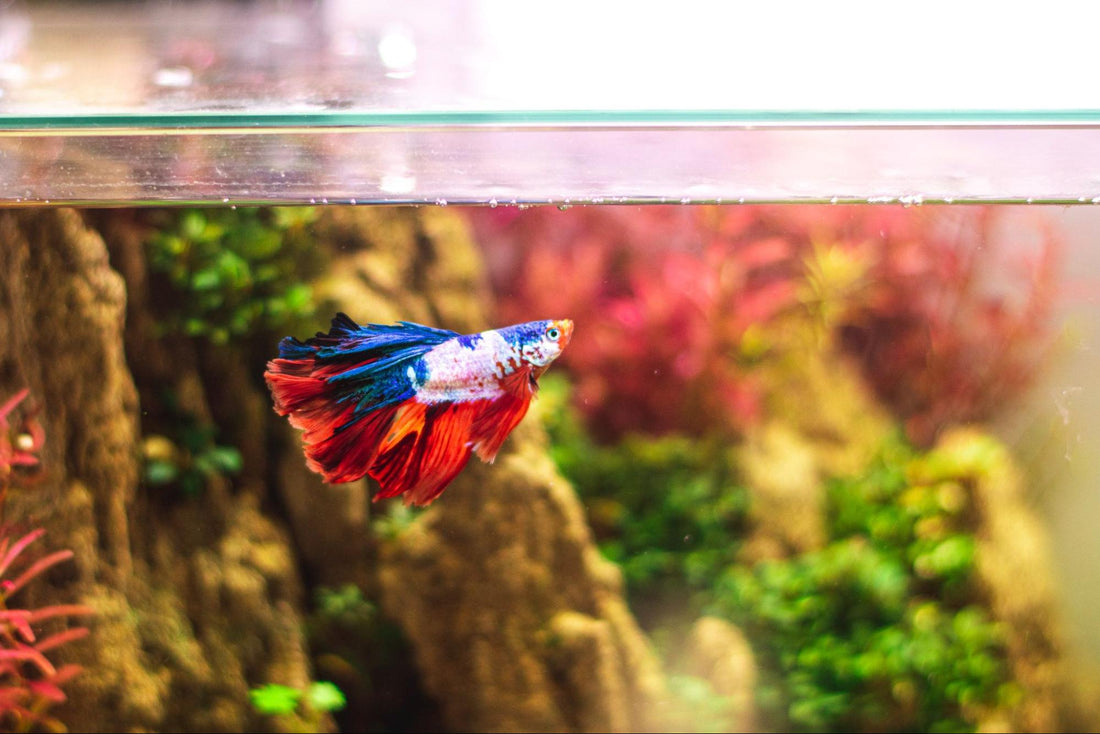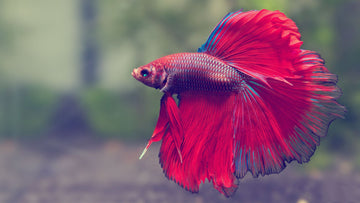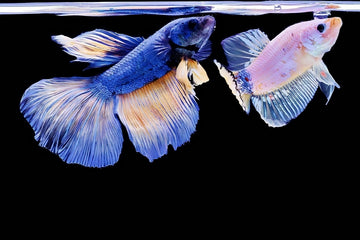Betta Fish Care - How to Keep Your Precious Betta Healthy

Contents
Have you ever found yourself captivated by the mesmerizing vibrant colors and graceful movements of a betta fish? These aquatic jewels are not just beautiful creatures, they are intelligent and fascinating pets that require proper care to thrive.
In this article, we will take a deep dive into the world of betta fish care, providing valuable tips and insights to ensure that your finned friend leads a happy and healthy life.
Whether you are a first-time betta owner or someone looking to refine your care techniques, this guide has something for everyone. So, let's embark on this journey together and discover the secrets to caring for these amazing creatures.
Choosing Your Betta
If you’re new to the enchanting world of Betta fish, you’re in for a delightful journey. These vibrant and graceful creatures can bring a splash of color and life to your home.

Betta fish, also known as Siamese fighting fish, are popular for novice and experienced aquarium enthusiasts. Originating from the warm, shallow waters of Thailand, Bettas are renowned for their striking colors and elaborate fin displays.
Here are some information that you may want to know about this beautiful fish species:
|
Parameter |
Ideal Range/Recommendation |
|
Tank Size |
5 gallons or more |
|
Water Temperature |
76° to 82°F (24° to 28°C) |
|
Water Change Frequency |
20-25% weekly |
|
Filtration |
Gentle; bettas prefer calm waters |
|
Lighting |
Moderate; avoid intense light |
|
Tank Cover |
Yes; bettas can jump out |
|
Diet |
High-quality betta pellets, frozen or live foods like brine shrimp or bloodworms |
|
Feeding Frequency |
1-2 times per day, in small amounts to avoid overfeeding |
You might encounter the Fancy Betta as you become more familiar with Betta. These Bettas are specially bred for their exceptional beauty, featuring various colors, patterns, and fin types. They are a testament to the diversity and allure of this fascinating fish species.
Read more: Check out our most fascinating betta fish species!
With the basics of choosing your Betta covered, let’s dive into the next section to ensure your new finned friends thrive in their new home.
Tips and Advices on Betta Fish Care
Should I Keep My Betta in a Bowl?
Considering a home for your betta fish? Skip the traditional bowl and think about providing a more spacious environment.

Betta fish thrive when they have ample room to swim, something a bowl can't offer. If you're in the planning stages, we recommend choosing an aquarium that holds at least 5 to 10 gallons of water.
Not only does this give your betta plenty of space, but it also reduces how often you'll need to clean the tank.
What Should I Know About Water Quality and Temperature for My Betta Fish?
Caring for your betta fish involves maintaining optimal water conditions to ensure their health and happiness. To keep your betta fish healthy, the water in their tank should have the following parameters:
- Temperature: 76° to 82°F (24.5° to 27.7°C).
- pH: 6.5 to 7.51.
- Ammonia: 0 ppm (parts per million).
- Nitrate: Less than 40 ppm.
- Nitrite: 0 ppm.
- General Hardness (GH): 50-66.7 ppm.
- Carbonate Hardness (KH): 53.6-89.4 ppm.

Now, most of us use tap water in our fish tanks, which is totally fine, but it does need a bit of prep. However, the issue with tap water is that it often contains chlorine, chloramines, and a variety of heavy metals—substances that can be harmful to betta and most other fishes.
But don't worry, treating it with a water conditioner or dechlorinator turns it into the perfect betta habitat. And if you're eyeing that bottle of spring water as a hassle-free alternative, go for it—just be sure to check the pH quickly to ensure it's in the betta comfort zone.
Next, high water quality is essential for the well-being of your betta fish, and regular water changes are crucial for maintaining this quality. Here’s how to do it safely:
- Treat fresh tap water with a conditioner to remove nasties, ensuring it matches the tank's current temperature.
- Use a siphon or a cup to remove 20-30% of the tank's water, keeping your betta inside, safe and sound.
- Gently introduce the new, treated water to the tank to avoid startling your betta with abrupt changes.
- On the rare occasions it's needed, move your betta to a safe spot, thoroughly clean the tank, and then fill it back up with treated and temperature-matched water.
While a filter can do wonders in keeping your water clean and reducing the need for frequent changes, a 40% water change every couple of weeks is still a good practice to follow. This keeps the water fresh and makes your betta's home a place where they can thrive.
How Should I Feed My Betta Fish Correctly?
Given that bettas are carnivores with specific dietary needs, what types of food should they eat, how often should they be fed, and what are some tips to prevent overfeeding?

Bettas require a diet rich in protein. They thrive on various foods, including specially formulated Betta pellets, which should form the core of their diet. These pellets are designed to float, encouraging Bettas to eat at the water’s surface, mimicking their natural behavior. You can also supplement them with live or frozen foods like:
- Bloodworms: Provide essential proteins and can be given as a treat.
- Brine Shrimp: Offer a good variety of nutrients and can help keep them active.
- Daphnia: Serves as a source of vitamins and can aid in digestion.
These supplements to your Betta’s diet can fulfill their nutritional needs and provide enrichment that keeps them engaged and healthy.
Bettas should be fed once or twice daily, with the amount they can consume within two minutes to avoid overfeeding. It’s very easy to overfeed betta fish, so make sure their belly does not become swollen with food, or else they may get constipation and other health issues.
Having one ‘fasting’ day per week is also beneficial to allow your Betta’s digestive system to process any uneaten food. This practice can help prevent constipation and bloating.
How Can I Prevent Common Illnesses in My Betta Fish?
Betta fish are not immune to health issues. However, there’s a silver lining for Betta enthusiasts! With the right knowledge and care, you can prevent most of these health hiccups. And even if your Betta does catch a bug, don’t worry—these conditions are usually straightforward to spot and treat.

These are some common diseases that your betta fish might catch in their life:
- Fin and Tail Rot
- Columnaris
- Hemorrhagic
- Dropsy
- Pop Eye
- Eyecloud
- Mouth Fungus
- Furunculosis
- Fish Fungus
- Velvet
- Ich
- Anchor Worms
- Hole in the Head
- Swim Bladder Disorder
- Betta Tumors
Remember, early detection and proper care are key to successfully treating your Betta. If you’re unsure about the diagnosis or treatment, it’s always best to consult a veterinarian specializing in fish health.
What Does the Social Life of Bettas Look Like?
Understanding the social dynamics of betta fish is essential for their well-being. Bettas are known for their solitary nature, often preferring to be alone. They don’t exhibit social behaviors like schooling or shoaling in the wild. They are territorial, especially males, and can exhibit aggression towards other bettas, which is why their nickname is “Siamese fighting fish”. However, this doesn’t mean they always must be kept in isolation. With careful planning, bettas can coexist with certain non-aggressive fish species in a community tank.

When introducing a betta to a community tank, it’s crucial to:
- Choose Compatible Tank Mates: Opt for peaceful fish that won’t nip at the betta’s fins or compete aggressively for territory.
- Provide Hiding Spots: Decorations and plants offer retreats for bettas and help reduce stress.
- Monitor Interactions: Monitor the betta’s behavior with tank mates to ensure no bullying or aggression.
- Maintain Water Quality: Stress-free living is facilitated by optimal water conditions, which are vital for a betta’s health.
By respecting their preference for solitude while understanding their capacity for peaceful cohabitation, you can create a harmonious environment that caters to the emotional health of your betta fish.
How Can I Ensure My Betta Gets Enough Exercise and Enrichment?
Betta fish thrive when they have the space to engage in their natural behaviors and activities, which are vital for their well-being. These activities include:
- Swimming
- Hunting
- Hiding
- Playing
- Resting

Given that bettas are territorial by nature and might not get along with other fish that look similar to them, you can keep them entertained and active with various toys, live or silk plants, and other safe aquarium decor.
Introduce some aquarium-safe ornaments and intriguing hideaways for your betta to weave in and out or hover around. It's crucial to select decorations free from sharp edges and ensure any passageways are spacious enough for your betta to glide through easily, avoiding any potential traps.
Elevate Your Betta Fish Care with TropicFlow
As we end our journey exploring the essentials of caring for your betta fish, it becomes evident that providing the proper support and supplies is crucial for their happiness and well-being. That's where TropicFlow comes in—a trusted online destination for betta sourcing.

Discover the TropicFlow difference and enjoy a seamless, all-in-one experience. More than just a store, TropicFlow is a vibrant community where betta enthusiasts can find everything they need, from premium betta food and safe water treatments to the latest advancements in tank technology.
Join us at TropicFlow and enhance your betta fish care with the knowledge and resources you need to create the perfect environment for your beloved bettas.
No comments











0 comments